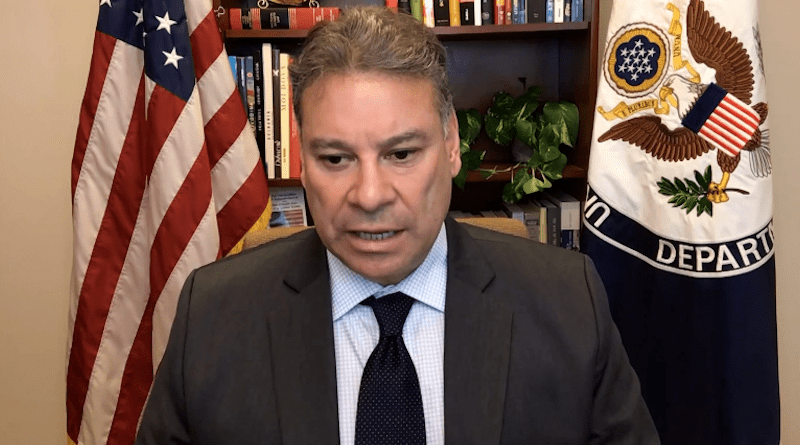US Sends Diplomat To Bosnia Amid Threats Of Serbs’ Secession
By RFE RL
(RFE/RL) — The U.S. administration is sending a top diplomat to Sarajevo amid growing concerns that the Serbian-majority entity that makes up part of Bosnia-Herzegovina could secede from the rest of the Balkan country.
U.S. Deputy Assistant Secretary of State Gabriel Escobar will arrive in the Bosnian capital on November 7, days after the top international official in the country warned of the “existential threat” from separatist actions by Bosnian Serb leader Milorad Dodik.
In an interview with RFE/RL ahead of his trip, Escobar said that any moves to undermine the Dayton accords that ended the three-year Bosnian War in the 1990s were “very detrimental and very destabilizing to the region.”
But he predicted there would not be another war in the country and that Dodik’s separatist agenda is not supported by the international community.
“I really want the people of Bosnia to know that we’re committed that there will not be a war. And believe me, all of the countries of the region, including the other signatories of Dayton, which includes Croatia and Serbia, are committed to not seeing a war in the region,” the U.S. diplomat said.
The Bosnian War ended in 1995 with the U.S.-brokered Dayton accords that created two entities in Bosnia, the Republika Srpska and the Bosniak-Croat Federation. The country is still governed and administered along ethnic lines established by the agreement.
But Dodik, the Serbian representative in Bosnia’s tripartite presidency, has been threatening to withdraw from state-level institutions, including Bosnia’s joint judiciary, military, and tax administration.
In a report to the UN Security Council this week, Christian Schmidt, the chief UN envoy to Bosnia, issued a stark warning that Dodik’s actions represent an “existential threat” to Bosnia’s postwar peace deal.
The prospects for further division and conflict in Bosnia “are very real,” Schmidt said, warning that the Bosnian Serb leader’s threats to withdraw from Bosnian state institutions would “ultimately undermine the state’s ability to function and carry out its constitutional responsibilities.”
As the country veers into crisis, the Biden administration is working with European and regional powers to ensure Bosnia’s territorial integrity and compliance with the Dayton accords.
In the interview with RFE/RL, Escobar insisted that the Dayton agreements had “held the peace for 25 years and it’s the basis of our policy.”
“With regard to the weakening of the central institutions…the reason behind this is really about corruption. What Milorad Dodik is doing is he’s trying to look for ways to protect his power and his money,” he said.
“So I’m asking people not to match that, not to enable him to do that.”

